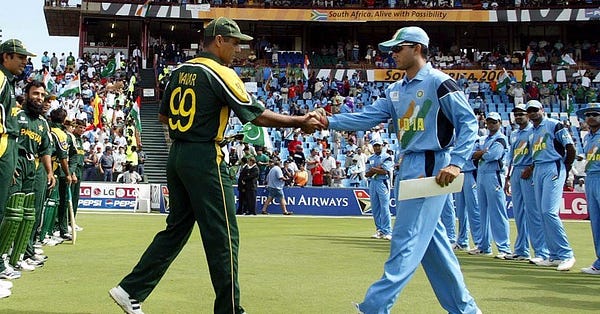14. History of a rivalry
India takes on Pakistan on Sunday. Their last four World Cup encounters have been straightforward wins for India
In some ways it is not much of a rivalry, at least as far as World Cups are concerned. India has played Pakistan in six of the last seven World Cups, and won all six by a comfortable margin. Perhaps barring the 1996 game, the pattern has been constant - the team batting first puts up an about par score, and then India seizes advantage in the first half of the chase, and then presses on it to win comfortably.
A few days ago, I had written to you about a new way to represent limited overs cricket, and mentioned that I’ll be looking back to that in future editions of this newsletter. And this is one of those future editions, where I’ll look at this “deep extra cover” tool to analyse the last four games that India and Pakistan have played at World Cups (unfortunately we don’t have ball by ball data for the 1992 and 1996 games, else they would’ve been much fun to analyse as well).
Old Trafford, 1999

This match went against the “run of play” in the tournament. Pakistan had topped its group while India was practically out of the tournament by this stage after its super six loss to Australia. Tendulkar made 45 at the top but India never got going once he got out. Dravid and Azhar made (slow) fifties as India plodded its way to 227.
Pakistan lost Afridi (who had replaced Wajahatullah Wasti for this game) early, but Saeed Anwar got them off to a good start. And then it was a story that repeats to this day - Srinath got Anwar and then Pakistan inextricably slowed down. Only 22 runs came off the next 10 overs in which they lost Saleem Malik and Ijaz Ahmed as well. The match was pretty much over midway through Pakistan’s innings, after which Venkatesh Prasad performed the last rites.
Centurion 2003

This is pretty much a mirror image of the previous game, given that India was chasing. Anwar was again the key batsman for Pakistan, making 101 off 126, but failed to receive adequate support from anyone else, and Pakistan ended up with a just-about-par 273.
It was the first time that India was chasing against Pakistan in the World Cup, but any doubts were laid to rest in the first five overs as India sped to 50. Waqar got Sehwag and Ganguly off consecutive balls, but then Kaif held one end up putting on a century partnership with Tendulkar. Kaif got out in the 22nd over but the match was pretty much over by then. Dravid and Yuvraj Singh were able to plod along as India won comfortably. In a way, this game was similar to the 1996 Delhi game between Sri Lanka and India, when Arjuna Ranatunga and Hashan Tillekeratne could again plod their way to a comfortable 270 chase thanks to a blazing start by Jayasuriya.
Mohali 2011

Sehwag and Tendulkar again got India off to a blazing start, but middle order wobbles meant that India only made 260. Tendulkar was dropped twice and had an LBW overturned by the DRS. Wahab Riaz took a 5-for for Pakistan.
Pakistan began well, but once they lost their fist wicket they started plodding. From 43/0 off 8 overs, they went to 106/4 in 26 overs - effectively making only 63/4 in 18 overs! They had won the 1992 World Cup by starting slow and accelerating towards the end of the innings, but a key component of the strategy was to keep wickets in hand.
Here, barring Umar Akmal they all just kept plodding. Captain Shahid Afridi batted too low at number 8 and by the time he came in the game was as good as over. Wahab and co had done a spectacular job in restricting India to 260, but the Pakistan top order batting badly let them down. Yet another comfortable win for India.
Adelaide 2015

Pakistan had their moments but were never in the game, giving India perhaps their most comfortable World Cup win against Pakistan to date. India lost Rohit Sharma early but Shikhar Dhawan and Virat Kohli put the team in a strong position. Inexplicably, after Dhawan got out, Kohli slowed down considerably.
Then, once Kohli got out, India collapsed to finish at only 300, losing 5 for 25 in the last 5 overs. If that might have given Pakistan a chance, they definitely did not seize it. Ahmed Shehzad plodded, and was soon joined by Haris Sohail in his ploddery. The game was pretty much over midway through the Pakistan innings when they were 103/5. Plodding and losing wickets doesn’t for make a good combination.
Old Trafford 2019
Hopefully we will have a game, given how much of this tournament has been lost already to rain. In their first three completed games Pakistan has shown that they can be very bad (West Indies), very good (England) and both (Australia). So it is hard to predict which Pakistan will turn up.
Despite a massive overhaul in personnel, they still seem vulnerable to plodding in the early part of their innings, and India must look to exploit that. For India, Rohit Sharma will again be key. If he settles in, Pakistan might have a tough time indeed. It will be interesting to see how this goes.
PS: For more on the history of the India-Pakistan contest in World Cups, listen to this excellent episode of the 81allout podcast, hosted by Siddhartha Vaidyanathan.





